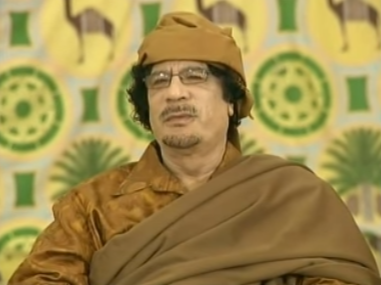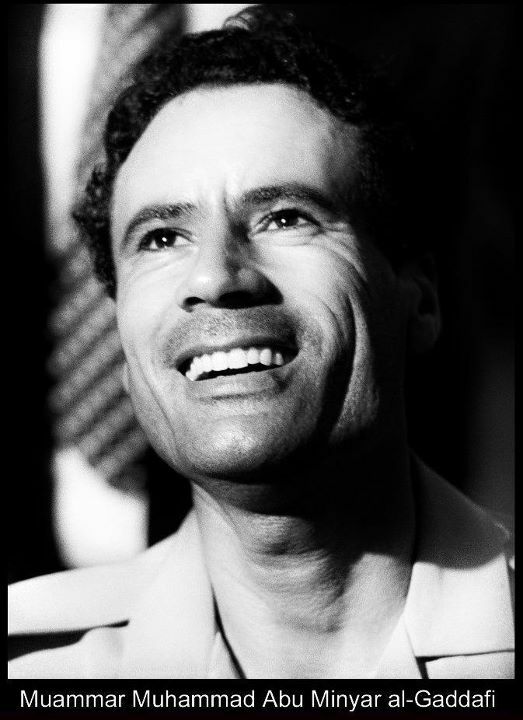
On April 26, 2010, the world witnessed what was then a rare diplomatic spectacle: a live satellite broadcast from Tripoli to Washington, D.C., featuring Libyan leader Muammar al-Gaddafi. The event, hosted by the World Affairs Council at the prestigious National Press Club and moderated by former U.S. Assistant Secretary of State Herman J. Cohen, was framed as a symbolic gesture toward “normalized” relations between Libya and the United States. It has since aged poorly.
Today, 15 years later — and 14 years after Gaddafi’s brutal killing during the NATO-backed war in 2011 — this webcast serves not only as a relic of a moment when diplomacy seemed possible, but also as a revealing document of Gaddafi’s critical misjudgments on the world stage.
A Warm Welcome to “Our Son Obama”
The most widely discussed moment of the broadcast was Gaddafi’s surprisingly warm praise of then-President Barack Obama. Addressing the audience in his trademark manner — simultaneously paternalistic and theatrical — Gaddafi referred to Obama as “our son”, citing his African and “possibly Muslim or Arab” roots.
This phrase, though likely meant as symbolic brotherhood in the context of pan-African or pan-Islamic solidarity, deeply misunderstood the cultural and political sensitivities in the West. Rather than building bridges, it reinforced perceptions in some U.S. circles that Gaddafi was attempting to exploit Obama’s identity for political gain.
In hindsight, Gaddafi had failed to recognize a central geopolitical fact: Obama’s presidency was not going to mark a fundamental shift in U.S. foreign policy toward regimes like Libya. He mistook symbolic progress for structural change.
Misreading Washington, Misjudging Kabul
Another striking aspect of Gaddafi’s comments was his take on Afghanistan. Gaddafi expressed optimism that Obama would withdraw American troops and end U.S. involvement there. But this hope proved wildly premature — Obama not only escalated troop deployments in Afghanistan during that period, but maintained a long-standing U.S. military presence throughout his presidency.
Here again, Gaddafi revealed a kind of wishful thinking, a miscalculation based on a belief that Libya’s post-sanctions “rehabilitation” had elevated it to a position of genuine influence in global affairs. The reality, as history would demonstrate, was that Libya remained geopolitically expendable.
The Women’s Rights Moment: A Shrug from the Past
When asked about women’s rights in Libya, Gaddafi gave a brief and tellingly conservative answer. While claiming that Libyan women had equal rights in principle, he added that “due to their physiology,” they were not capable of performing many of the same tasks as men. The remark, delivered without nuance, was received with polite silence — but it highlighted the underlying ideological divide that persisted between Libya’s traditionalist framework and the West’s more progressive rhetoric on gender equality.
This was another missed opportunity. Gaddafi could have used the moment to paint a more modern image of Libya. Instead, he reinforced the very stereotypes that had historically alienated Western opinion.
The Trojan Horse: A Metaphor in Retrospect
From the vantage point of 2025, it is clear that this broadcast now stands as a chilling precursor to what came next.
Despite his claims that the “past was behind us,” and his faith in improved relations with Washington, Gaddafi failed to recognize the strategic interests lining up against Libya. The sanctions relief and trade talks may have looked like peace offerings — but to critics, they were the prelude to “Operation Trojan Horse.” The idea that Western normalization was used to make Libya more vulnerable, less armed, and easier to destabilize has gained traction in critical postwar analyses.
Less than a year later, the U.S., UK, France, and NATO allies were bombing Libya. Gaddafi, who once gave a speech on nuclear nonproliferation during this very webcast, had voluntarily disarmed years earlier — a decision that would cost him dearly.
Legacy of the 2010 Broadcast
What was marketed as a gesture of mutual understanding has, in hindsight, become a symbol of tragic naivety. Gaddafi believed diplomacy could secure Libya’s place in the international order. He misread Obama’s intentions, underestimated Western interest in reshaping the region, and overestimated the strength of Libya’s geopolitical position.
The 2010 broadcast is now rarely referenced in official histories — but it deserves to be remembered, if only as a stark reminder of how misplaced faith in imperial diplomacy can hasten a nation’s fall.
🗒️ Footnote: Even Gaddafi, for all his paranoia and anti-imperial rhetoric, failed to see that the “Trojan Horse” wasn’t coming. It had already been wheeled into the gates.
